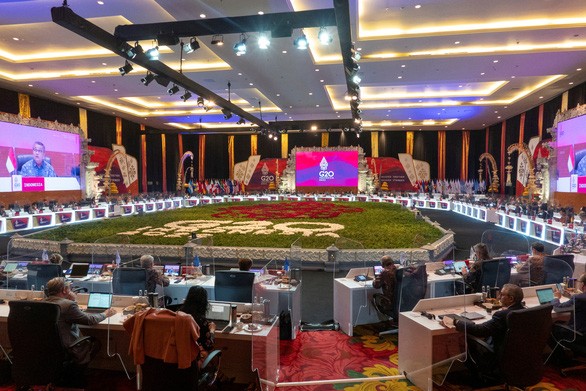(VOVWORLD) - Despite response efforts by governments and international organizations, the global economy is facing serious challenges. The risk of recession for many major economies will remain high this year and beyond.
 G20 Conference of Finance Ministers and Central Bank Governors of the world's major developed and emerging economies in Indonesia (photo: reuters) G20 Conference of Finance Ministers and Central Bank Governors of the world's major developed and emerging economies in Indonesia (photo: reuters) |
At the G20 Conference of Finance Ministers and Central Bank Governors of the world's major developed and emerging economies in Indonesia last week , Managing Director of the International Monetary Fund (IMF) Kristalina Georgieva warned that the global economy is "particularly uncertain" and could get worse if inflation, now at a record high in many large economies, continues unchecked.
Concerning indicators
The Russia-Ukraine conflict and Western sanctions against Russia are disrupting the global supply chain, driving up prices of oil, gas, and food, and exacerbating economic difficulties in countries that have been hit hard by the COVID-19 pandemic over the last two years.
The inflation rate in many major economies has broken records set decades ago. In the US, the world's largest economy, inflation has risen sharply in recent months despite countermeasures, including the FED’s decision to raise interest rates sharply.
The US Treasury Department reported that inflation in June increased 9.1% over the same period last year, far exceeding the record of 8.6% in May – the highest level in the past 40 years. US Treasury Secretary Janet Yellen described it as "unacceptably high" inflation.
The situation in most EU economies is no better. Prices in Italy were 8% higher in June than a year earlier, after the highest one-month increase in prices in 36 years, Italy’s National Statistics Institute said.
France’s inflation accelerated to its highest level since 1991, with consumer prices jumping 5.8 percent compared to the same month last year.
Meanwhile, in Germany, the EU's largest economy, inflation rose 7.9%, the highest level since 1990 and far above the 2% target set by the European Central Committee. The euro has steadily depreciated, reflecting the weakening of the bloc’s overall economic strength.
China, the economy that is still considered to have good immunity to the current global inflation, reported a GDP growth in the second quarter of 0.4%, much lower than forecast and the growth target set by the Chinese government. The reason for China’s weak growth is fundamentally different from most other economies. China has imposed strict lockdown measures on a large scale to control the COVID-19 pandemic, which has limited production and business activities. Whatever the reason, China’s low growth rate is still considered an unfavorable indicator for the global economy.
Prospects and solutions
The situation is increasingly grave for economies in or near debt distress, including 30 percent of emerging market countries and 60 percent of low-income nations. The IMF Managing Director has called on countries to take every possible action to curb inflation. She said the IMF will soon decide whether to expand the Fund for Poverty Reduction and Sustainable Growth.
So far the G20 has pledged 10.5 billion USD to the Fund, which will cover only 75% of the demand. Meanwhile the US Treasury Secretary said governments should establish and maintain policy response scenarios to minimize the severity of the economic downturn and its impacts on people and businesses.
Economists say the number one solution is to end the Russia-Ukraine conflict. Instead of punishments and retaliation, parties should be focusing on dialogues and diplomatic exchanges to resolve the conflict.